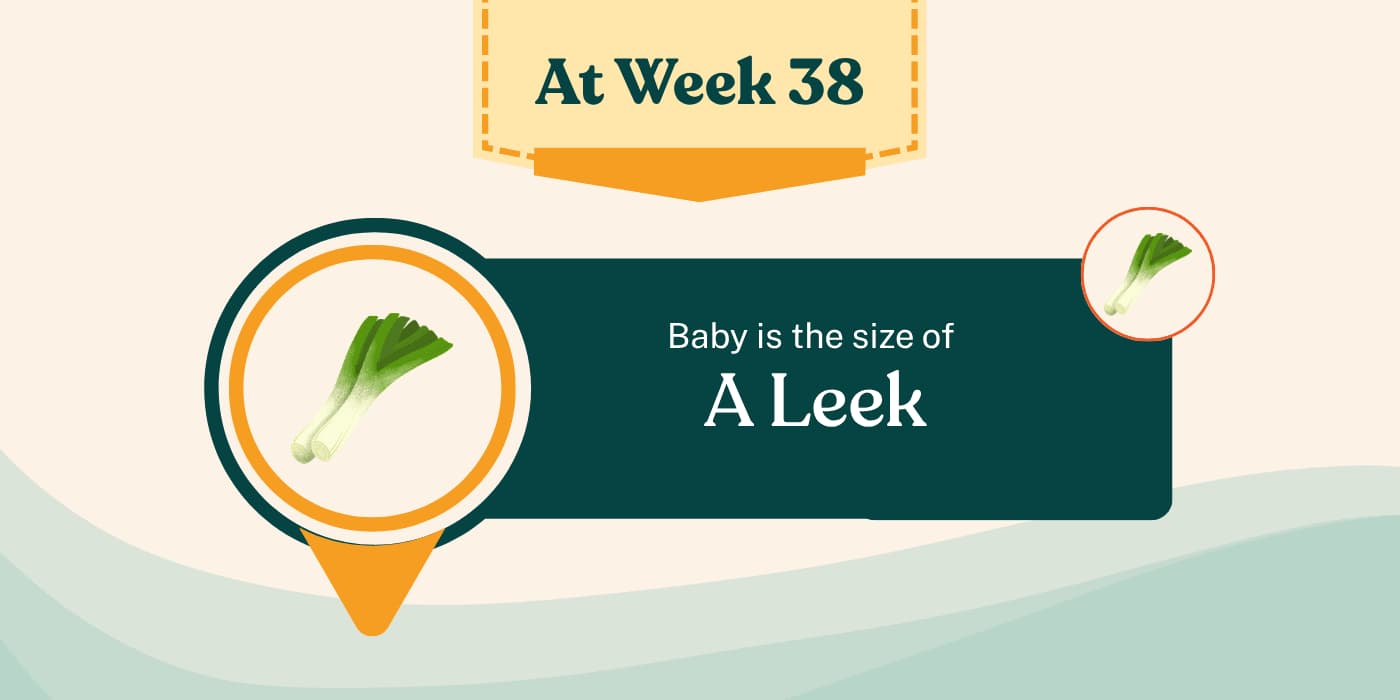Your Pregnancy at Week 38
Science Photo Library
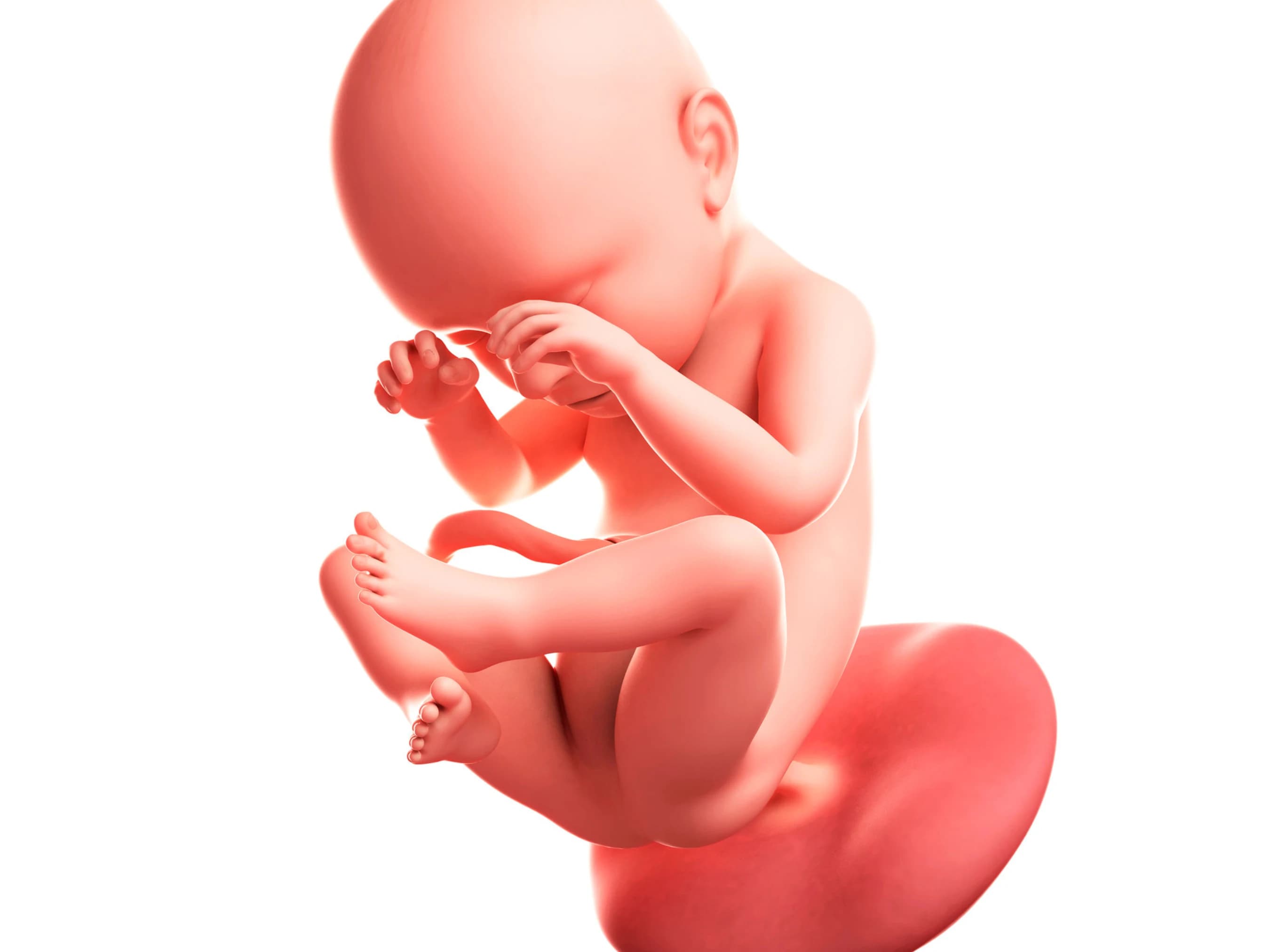
Written by Mindsmaking Medical Writer
Fact Checked by Mindsmaking Professionals
27th, July, 2025
You're close to meeting your baby, and your body is busy preparing for the big day. As you experience this final stretch, you might notice new symptoms and changes.
Welcome to week 38 of your pregnancy! It's amazing how quickly the time has passed, and you're now only a few weeks away from meeting your baby. Alternatively, it might feel like these 38 weeks have dragged on. As you enter this final stretch, you'll likely experience excitement, physical changes, and some surprising moments.
Key Takeaways
Most organs are mature and functioning, except for the brain and lungs, which will continue to develop throughout childhood.
Your baby measures around 19.61 inches and weighs about 3083 grams, comparable to a leek.
Pregnancy hormones can cause emotional highs and lows. It's normal to feel joy, excitement, and occasional tears.
Your baby bump has grown significantly, and tasks like bending over or tying your shoes are challenging. Don't hesitate to ask for help if needed.
As your baby's head descends into your pelvis, it puts pressure on your bladder, leading to more frequent urination.
Sudden or severe swelling in the hands, face, feet, or ankles may signal pregnancy-induced hypertension (PIH), also known as preeclampsia or toxaemia.
Gentle exercise, like walking, can help reduce swelling and improve circulation.
Getting a special gift for your partner can serve as a reminder of your love and appreciation.
Learning about the postpartum period can help you understand what to expect in the early weeks and months and feel more prepared.
Take a peek
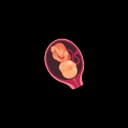
Falling hair
Lanugo, the fine soft hair covering your baby's body for warmth, is falling out in preparation for birth. Most of this hair falls out before a full-term baby is born, though some may remain on the baby's shoulders and arms.
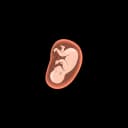
Eye colour
Knowing your baby's eye colour can be tricky. If they're born with brown eyes, they'll likely stay brown. But if the eyes are grey or blue, they might stay that way or change to green, hazel, or brown. The final colour shows by the time your baby turns nine months old.
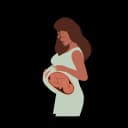
Stronger grasp
Your baby's hands have fully formed nails extending to their fingertips. Your baby has developed a strong grip, which you'll soon experience when they grab your finger for the first time.
Baby Development at Week 38
Your baby, or foetus, is now approximately 19.61 inches long from head to heel, about the length of a leek. Earlier in the second trimester, the baby was covered in a soft, downy layer of hair called lanugo, which has mostly disappeared by now, though some babies may still have patches at birth. The baby's bowels are accumulating meconium, a sticky green substance made from everything they have swallowed in the womb, including amniotic fluid and hair. This meconium will typically be passed as the baby's first bowel movement after birth. However, if the baby passes meconium during labour, it could indicate distress, and the baby will need to be closely monitored. (5)
Your baby continues to grow, and while most of the organs are now mature and functioning well, the brain and lungs are the exceptions. These two organs can work outside the womb but will develop throughout childhood. As you anticipate your baby's arrival, you might be curious about their appearance. Perhaps you hope your baby will have your hair colour, your partner's green eyes, or your dad's long legs. However, it may be difficult to determine your baby's eye colour immediately after birth unless the eyes are brown, in which case they are likely to remain brown. If your baby's eyes are grey or blue, they might stay that way or gradually change to green, hazel, or brown, typically by the time your baby reaches nine months old. (1)
The baby's hands are now fully developed, with nails that reach the tips of the fingers and a strong grasp that you'll soon feel when your little one grabs your finger for the first time. The intestines are accumulating meconium, which will be the baby's first bowel movement after birth. At this stage, the circumference of the baby's head and abdomen are roughly the same size, a key indicator of healthy development.
Mindsmaking
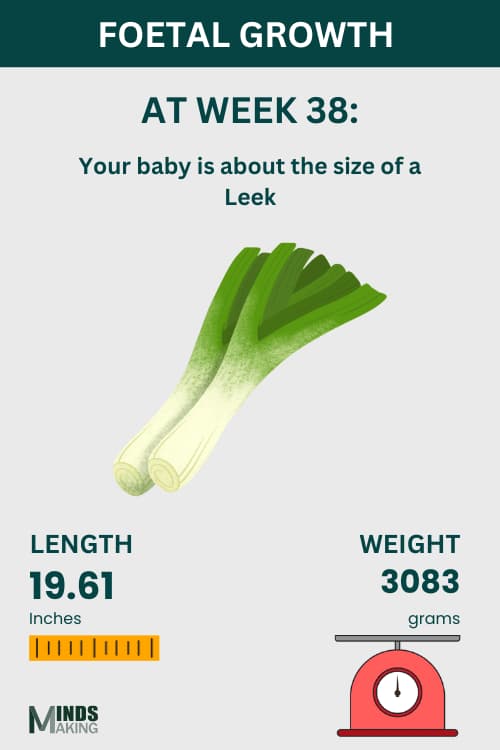
Body Changes at Week 38
Your nesting instinct, which may have surfaced earlier, is now in overdrive. You might find yourself rearranging the nursery for the hundredth time, carefully washing baby clothes, and going over your hospital bag checklist with the precision of a detective. It's as if your maternal instincts have shifted into high gear, pushing you to ensure everything is right for your baby's arrival.
Pregnancy hormones can make your emotions feel like a rollercoaster. One moment, you're filled with joy and excitement about your baby's arrival; the next, you might find yourself tearing up. These emotional swings are normal, so allow yourself to experience and express your feelings.
You may start noticing signs that labour could be near, such as increased Braxton Hicks contractions, lower back pain, or even the loss of your mucus plug. While these signs can be exciting, they don't necessarily mean labour is imminent. Stay mindful of them, but keep calm and composed. (4)
Read This Next
No posts available
Baby Bump At Week 38
Your baby bump has grown significantly, so you may feel like you're carrying a bowling ball. This may make everyday tasks like bending over or tying your shoes challenging, so don't hesitate to ask for help.
You're almost at the end of your pregnancy, and your uterus will complete its expansion this month. At the beginning of your pregnancy, your uterus may have weighed around 2 ounces, but now it could weigh approximately 2 and a half pounds.
Pregnancy Symptoms at Week 38

Bloody show
As you approach labour, you might notice a mucus discharge that's tinged with pink, brown, or red blood, known as the "bloody show." This is a sign that your body is getting ready for childbirth. The bloody show typically indicates that labour is not far off, so it's important to watch for it. You should contact your doctor or midwife to inform them when you see this discharge, as it usually signals that labour could begin soon.

Lightning crotch
At 38 weeks pregnant, you might suddenly experience a sharp, jolting pain in your pelvis or groyne, often referred to as "lightning crotch." Despite its alarming name, the lightning crotch is harmless and typically very brief. This sensation is usually described as a sharp, electric shock-like pain that comes on suddenly and disappears just as quickly, often lasting only a few seconds. Doctors believe that lightning crotch occurs when your baby's head presses against the nerves in your cervix and lower uterus. It's most common in the later stages of the third trimester, as your baby drops lower into your pelvis in preparation for birth.
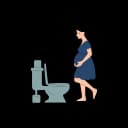
Constant urination
As your baby's head moves down into your pelvis in preparation for birth, it puts added pressure on your bladder. This pressure makes your bladder feel full more often, leading to frequent toilet trips. While it might be tempting to drink less to avoid these constant bathroom visits, it's essential to stay well-hydrated, especially as you get closer to giving birth. Dehydration can lead to complications, so continue drinking plenty of fluids. However, it's a good idea to avoid caffeine since it's a diuretic, which means it can make you need to urinate even more often, adding to the inconvenience.
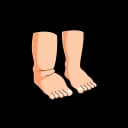
Swollen ankles and feet
Your body will produce and retain more fluid than usual, leading to swelling or oedema, particularly in your hands and legs. To help manage this, try to rest with your feet elevated, drink plenty of water to aid in flushing out excess fluid, and opt for loose-fitting clothes and shoes to stay comfortable. Additionally, wearing support tights or socks can help alleviate swelling and discomfort by providing gentle compression.

Nausea:
At 38 weeks pregnant, you might experience slight nausea again, sometimes indicating that labour is approaching. Managing it by eating several small meals throughout the day can help if you feel queasy. Stick to bland foods such as bananas, rice, or toast, which are gentler on your stomach and can help reduce nausea.
Pregnancy Concerns at Week 38
At 38 weeks pregnant, it's common to notice some swelling in your feet due to the increased fluid retention that often occurs late in pregnancy. This mild swelling is generally normal. However, if you experience sudden or severe swelling in your hands, face, feet, or ankles, it's important to contact your healthcare provider. Such swelling could indicate a condition called pregnancy-induced hypertension (PIH), also known as preeclampsia or toxaemia, which requires medical attention.
Health Tips for Pregnancy Week 38
Go for a walk
Consider walking to help reduce swelling and enjoy the fresh air. Gentle exercise can promote circulation and alleviate some swelling. Plus, being outside can provide a pleasant change of scenery. Before you know it, you'll be strolling with your baby in the park, making the most of the outdoors together.
Keep yourself comfortable
Being comfortable during the final stages of pregnancy is key to managing the physical discomforts that come with it. Opt for loose-fitting clothing and soft fabrics that don't pressure your abdomen. Choosing comfort over style can make a big difference in helping you stay relaxed and focused as you await your baby's arrival. Wearing your favourite, cosy outfits can also boost your mood and help you feel at ease during this time.
Practice self-care
At this stage of pregnancy, focusing on self-care is crucial. Eating a balanced diet, staying well-hydrated, and resting as needed are important for your well-being. Attending prenatal yoga or meditation classes can promote relaxation and reduce stress. Simple deep breathing exercises can also be effective in managing anxiety and keeping calm as you approach your baby's arrival.
Learn perineal massage
At this stage in your pregnancy, learning perineal massage can be beneficial. This technique involves gently massaging the area between your vagina and anus (the perineum) to increase its flexibility. Improved flexibility can help reduce the likelihood of tearing or needing an episiotomy (a surgical cut made during childbirth) by making the perineum more supple and better able to stretch during delivery.
Wear comfortable shoes
During the final trimester, comfort should be your main focus, especially regarding footwear. Tight or restrictive shoes can exacerbate discomfort, particularly as your feet are likely swollen and sore. Choose shoes that offer flexibility and ample space to accommodate swelling. Soft, supportive, and adjustable styles ease foot pain and make daily activities more manageable. At this stage, prioritising comfort over style will ensure your feet stay happy and pain-free as you approach your due date.
Advice for Partners
If you've not packed your hospital bag yet, now's a good time to do so, as your baby could arrive any moment. Many dads like to give their new son or daughter a special gift. If you plan on doing this, consider packing it in your bag. You might also want to consider getting your partner a special gift to remind her of your love and appreciation. These gifts don't have to be extravagant or expensive, just a thoughtful gesture to show you care.
Pregnancy Checklist for Week 38
- Familiarise yourself with newborn screening tests. All states mandate these tests to identify rare but serious conditions, such as hearing loss, congenital heart defects, and metabolic disorders.
- At 38 weeks pregnant, ensure you have a plan for postpartum care, including child or pet care arrangements while in the hospital. This will help you feel prepared and reduce stress if labour starts earlier than expected.
- Take some time this week to learn about the postpartum period. Understanding what to expect in those early weeks and months can help you feel more prepared.
- Create a list of essential items you're still using, like your phone charger and toothbrush, so you can quickly add them to your hospital bag when it's time to go.
- If you're planning to breastfeed your baby, it may be helpful to look into lactation consultants in your area. A lactation consultant can assist you in getting started and guide you through any challenges with breastfeeding.
Frequently Asked Questions
How big is my baby at week 38?
At week eleven, your baby is about 19.61 inches in length. This roughly equals the size of a leek and weighs about 3083 grams.
Can I deliver at 38 weeks pregnant?
Yes, it is possible to deliver at 38 weeks pregnant. Babies born at 38 weeks are considered "early term." They are usually well-developed and can thrive outside the womb, although they may benefit from a little extra time for full maturation. Inducing labour at 38 weeks may be necessary if there are medical complications such as preeclampsia, gestational diabetes, a uterine infection, or placental issues. For those carrying twins, induction might also be recommended around this time. However, if there are no complications and both you and your baby are healthy, it's generally best to allow labour to start naturally and give your baby full time in the womb if possible.
Does lightning crotch at 38 weeks mean labour is coming?
Lightning crotch at 38 weeks doesn't necessarily mean labour is imminent. This sharp, sudden pain in the pelvis or vagina is common as the baby applies pressure to the cervix and nerves. While it can occur as the body prepares for labour, it is not a definitive sign that labour is about to start. Lightning crotch can happen at various points between 28 and 40 weeks of pregnancy. Monitor any other signs of labour and stay in touch with your healthcare provider.
Why does my belly feel so tight at 38 weeks pregnant?
If you're experiencing a tight or hard feeling in your belly that comes and goes irregularly, it might be Braxton Hicks contractions, which are often referred to as false labour contractions. These contractions are usually sporadic and can be relieved by changing positions or walking around. However, suppose the contractions become more frequent every five minutes, lasting about 60 to 90 seconds each, and persist regardless of your activity or position. In that case, they may be true labour contractions. In this situation, you should contact your doctor immediately, as these are signs that labour may be starting.
Was this article helpful?
How many stars are you giving this article?
Leave a comment
Your email address will not be published.
